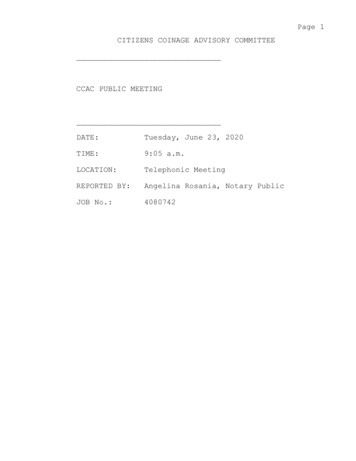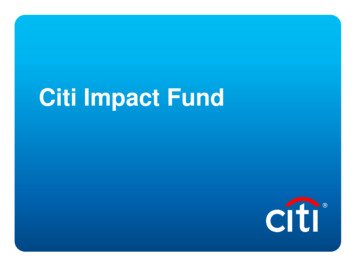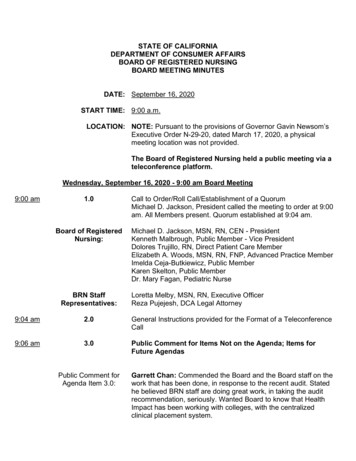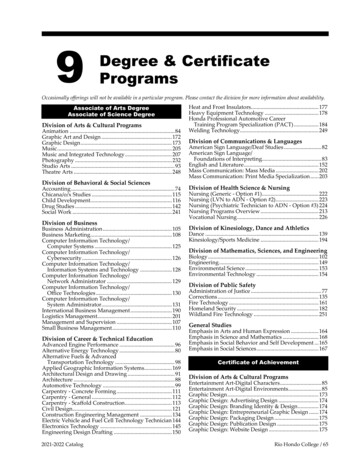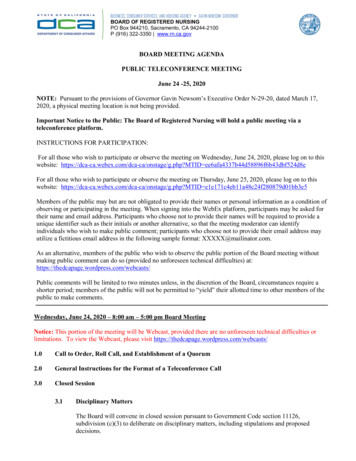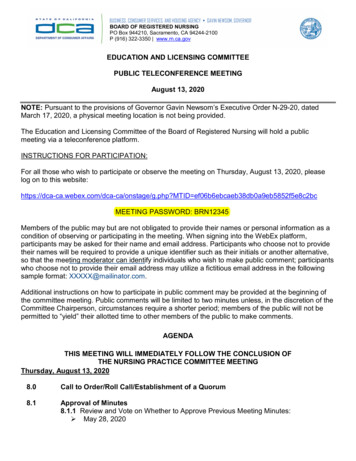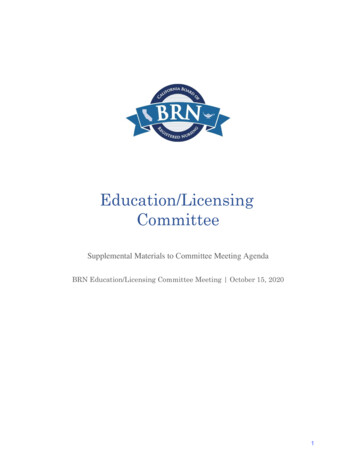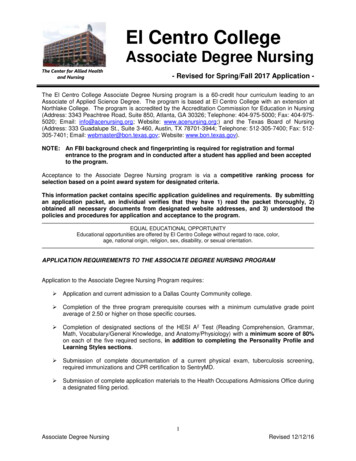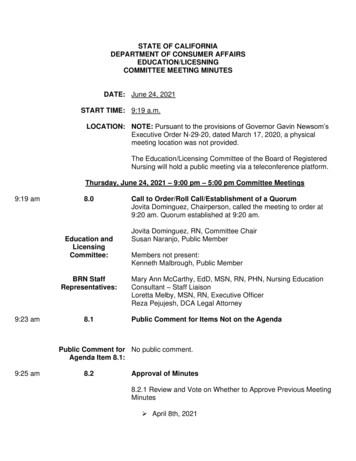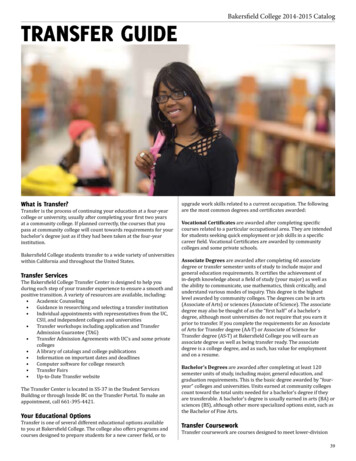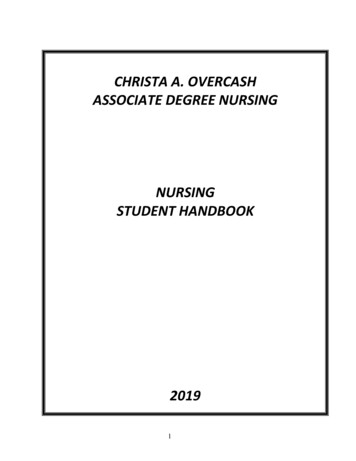
Transcription
CHRISTA A. OVERCASHASSOCIATE DEGREE NURSINGNURSINGSTUDENT HANDBOOK20191
NOTEThis Nursing Student Handbook has been reviewed and revisedAugust, 20192
CENTRAL PIEDMONT COMMUNITY COLLEGECHRISTA A. OVERCASHASSOCIATE DEGREE NURSING PROGRAMTable of ContentsNursing Student Handbook, Part I . 5INTRODUCTION . 6NURSING DIRECTORY. 7MISSION STATEMENT . 8Mission . 8The Associate Degree Nurse . 8Associate Degree Nursing Education . 8Conceptual Framework . 8CURRICULUM DESCRIPTION . 10Definitions: . 10NLN Core Competencies . 11QSEN Competencies . 11STUDENT LEARNING OUTCOMES . 17PROGRAM OF STUDY ASSOCIATE DEGREE NURSING – ADN (A45110) . 18EVALUATION OF TEACHING PERFORMANCE . 20EVALUATION OF PROGRAM . 20FACULTY/STUDENT COMMUNICATION . 20Faculty Office Hours . 20Student Communication . 20IT Support . 20CLINICAL FACILITIES . 20Transportation to These Facilities . 21CPCC CLASSROOMS AND LABS . 21NAME, ADDRESS, AND TELEPHONE CHANGES . 21ADA COMPLIANCE . 21TITLE IX COMPLIANCE: . 21ADMISSION/ PROGRESSION/ GRADUATION (APG) . 22GRADUATION. 22Requirements for Graduation: . 22LICENSING ISSUES . 22Nursing Student Handbook; Part II . 23I. ACADEMIC INTEGRITY. 24II. CODE OF CONDUCT AND PROFESSIONAL BEHAVIORS . 24Professional Behaviors . 24III. CLASSROOM AND LAB POLICIES . 25Classroom and Lab attendance . 25Classroom Attendance Requirements. 25Classroom Tardiness. 26Nursing Laboratory Attendance Requirements . 26Nursing Skills Validation . 26Classroom Lecture Recording Policy . 27IV. CLINICAL REQUIREMENTS . 27Clinical Guidelines . 273
CENTRAL PIEDMONT COMMUNITY COLLEGECHRISTA A. OVERCASHASSOCIATE DEGREE NURSING PROGRAMGeneral Clinical Guidelines. 27Clinical Dress Code for All Clinical Experiences: . 27Clinical Attendance Requirements . 28Working and Clinical Performance . 29Critical Clinical Behaviors: . 30IV.-A. NURSING PROGRAM ESSENTIAL FUNCTIONS . 30IV.-B. STANDARDS FOR SAFE PRACTICE . 32IV.-C. UNSAFE CLINICAL BEHAVIORS . 35IV.-D. CLINICAL SIMULATION LEARNING CENTER. 35V. MEDICATION DOSAGE CALCULATION PROFICIENCY EXAMINATION . 36VI. GRADING POLICY . 36VII. EXAMS IN THE NURSING DEPARTMENT . 37Assessment Technologies Institute or ATI . 39VIII. WITHDRAWAL/ PROGRESSION/ READMISSION/DISCIPLINE POLICIES . 39Withdrawals (W) . 39Emergency Withdrawal Policy. 40Incomplete Policy . 40Progression Policy . 41Procedures for Disciplinary Review . 41Dismissal Policy . 42Readmission Policy . 42Transfer Policy . 43IX. INSURANCE, LIABILITY, HEALTH RECORDS . 43Student Medical Records . 43CPR Requirements . 44Drug Screening Policy . 44Substance Use/Impairment Policy . 45Criminal Background Check. 45Infectious/Contagious Disease . 46Latex Sensitivity . 46OSHA Training and Exposure Incident. 46Health Insurance Portability & Accountability Act (HIPAA) . 47X. INCLEMENT WEATHER POLICY . 47Dismissing Classes Because of Inclement Weather . 47XI. POLICY REGARDING USE OF SOCIAL MEDIA . lic-relations/social . 3-social-networking-and-nurses.pdf . 48EDUCATIONAL REMEDIATION PLAN . 49RETURN REMEDIATION PLAN . 50CONFIDENTIALITY AGREEMENT AND VIDEO RECORDING CONSENT . 514
CENTRAL PIEDMONT COMMUNITY COLLEGECHRISTA A. OVERCASHASSOCIATE DEGREE NURSING PROGRAMNursing Student Handbook, Part I5
CENTRAL PIEDMONT COMMUNITY COLLEGECHRISTA A. OVERCASHASSOCIATE DEGREE NURSING PROGRAMASSOCIATE DEGREE APPLIED SCIENCE – NURSINGINTRODUCTIONWelcome to the Christa A. Overcash Associate Degree Nursing (ADN) Program at Central PiedmontCommunity College (CPCC) at Charlotte. The profession you have chosen to pursue is very challengingand demanding, yet very rewarding.Preparation for the role of professional nurse is a shared venture: a collaboration between student andfaculty. We are here to facilitate your education through teaching. Learning, which is your input, occursas you discipline yourself to the study of nursing.This Handbook is compiled to answer and explain in detail, certain aspects specific to the nursingprogram. Part I contains the mission/values and philosophy of nursing education and the conceptualframework guiding the ADN curriculum. From these documents, the course objectives and programoutcomes are derived. Part II contains college level policies as well as policies specific to the nursingprogram.The Handbook is to be used in conjunction with two other college publications – The CPCC Catalog andthe CPCC Student Handbook. You will note as you read through this handbook reference made to theseother college publications.We look forward to supporting you during your educational development and hope this will be awonderful experience.The FacultyCentral Piedmont Community CollegeChrista A. Overcash Associate Degree Nursing ProgramThis nursing program has full approval by the NC Board of Nursing.North Carolina Board of Nursing4516 Lake Boone TrailRaleigh, NC 27607Phone: (919) 782-3211Fax: (919) 781-9461This nursing education program is accredited by the Accreditation Commission for Education inNursing (ACEN).ACEN3343 Peachtree Road NE, Suite 850Atlanta, GA 30326Phone: (404) 975-5000Fax: (404) 975-50206
CENTRAL PIEDMONT COMMUNITY COLLEGECHRISTA A. OVERCASHASSOCIATE DEGREE NURSING PROGRAMNURSING DIRECTORYNameTitleOfficeTelephonePaul Koehnke, EdDDean, Central Campus(704) 330-6121Maureen Bumba, MSN, FNP, RNJeanette Cheshire, DNP, RNDean of Health Professions andHuman ServicesDirector of Nursing EducationOvercash,210-EBelk 1109Belk 3135(704) 330-6451Nichitia Ethridge (Nickey)Administrative SecretaryBelk 3137(704) 330-2722 ext. 3416Nazirah PearsonAdmissions SpecialistBelk 1105-D(704) 330-6284Charlene JamesMedical Records SpecialistBelk 1105-C(704) 330-6163Glenda NnajiCurriculum CoachBelk 1104(704) 330-6434Cynthia Beesley, MSN, RNFacultyBelk 3156(704) 330-2722 ext. 3426Chris Burns, MSN, RNC-OB, CNSProgram ChairBelk 3144(704) 330-6124Lynee Carter, MSN, RNFacultyBelk 3142(704) 330-2722 ext. 3471Melanie Colson, MSN, RNFacultyBelk 3149(704) 330-2722 ext. 3479Crystal Eaker, MSN, RNFacultyBelk 3157(704) 330-2722 ext. 3231Emily Gullena, MSN, RNFacultyBelk 3139(704) 330-3417Erin Montgomery, MSN, RNFacultyBelk 3155(704) 330-2722 ext.3430Ann Moss, MSN, RNFacultyBelk 3158(704) 330-6420Kara Off, MSN, RN, PCCNFacultyBelk 3141(704) 330-2722 ext. 3429Lynne Ordoyne, MSN, RNFacultyBelk 3138(704) 330-2722 ext. 3439Kent Rittenhouse, MSN, RNFacultyBelk 3153(704) 330-6779Colleen Russell, MSN, RNFacultyBelk 3145(704) 330-2722 ext. 3478Lisa Scott, MSN, RNFacultyBelk 3140(704) 330-2722 ext. 3438Kelly Wright, MSN, RNC-OBFacultyBelk 3146(704) 330-2722 ext. 34727(704) 330-6729
CENTRAL PIEDMONT COMMUNITY COLLEGECHRISTA A. OVERCASHASSOCIATE DEGREE NURSING PROGRAMMISSION STATEMENTA Model of a PhilosophyMissionThe Associate Degree Nursing (ADN) program supports the mission of the North Carolina Community College System(NCCCS) and the mission of CPCC. The faculty is committed to providing accessible high quality nursing education tomeet the diverse and changing health-care needs of the surrounding area and to promote the development of qualifiedstudents, grounded in theoretical knowledge and the application of critical thinking. The philosophy of the ADN programis derived from statements about the health, quality of life, achievement of potential, the individual, environment,healthcare system, nursing, the practice, and education of the Associate Degree Nurse.Within this mission, the goal of nursing faculty is to promote the highest quality of nursing care to the individual, familiesand significant persons, and the community. The aim is to facilitate optimum health, quality of life and achievement ofpotential for the individual.The Associate Degree NurseGraduates of the ADN program at CPCC are prepared for the professional role of the registered nurse at the entry leveland meet the education requirements necessary to take the National Council Licensure Examination (NCLEX).Educational competencies that the graduates are prepared for during their education include competencies defined bythe National League for Nursing [NLN] (2000, 2010) and the Nursing Practice Act of North Carolina. The practice ofnursing is directed toward meeting the health care needs of individuals throughout their lifespan. The practice role ofthe ADN graduate is characterized by evidence-based clinical practice with the provision of care for individuals andfamilies in structured settings.Associate Degree Nursing EducationADN nursing education is a process that facilitates changes in behavior, the acquisition of knowledge, skills, andattitudes necessary to function in the role of the entry-level nurse. Evidence-based nursing theory and practice, generaleducation, and the sciences are incorporated in an environment conducive to learning. The conceptual design definesthe essential elements as the environment, quality of life, achievement of potential, and health. The organizingframework contains content related to the individual, the health care system and nursing. Through these educationalexperiences, students will have the opportunity to develop critical thinking and problem solving skills.The ADN program at CPCC provides an education that is flexible, progressive, and sensitive to the changing needs of theindividual, significant support person(s), and community. Learning is a continuous process that results in a change ofbehavior and occurs when the individual is challenged and motivated to enhance personal knowledge. Teaching andlearning is an interactive process between teacher and learner. The responsibility of the faculty of CPCC ADN Program isto facilitate the student’s understanding and ability to meet the competencies for nursing practice through the designand evaluation of learning experiences. The nursing student is responsible for actively participating in learningexperiences and develops the knowledge, skills, and attitudes necessary to provide quality individual centered nursingcare.Graduates of this program are eligible to apply to take the National Council Licensure Examination - Registered Nurse(NCLEX-RN). Employment opportunities are vast within the global health care system and may include positions withinacute, chronic, extended, industrial, and community health care facilities.Conceptual FrameworkThe conceptual model provides a mental scaffold or framework to prepare learners for new instruction and motivates bymaking a meaningful connection for the learner. The conceptual framework and the student learning outcomes for thenursing program encompass three domains: the individual, nursing, and the healthcare system. The learner must mastereach domain of the conceptual framework to complete the curriculum. The conceptual design defines the essential8
CENTRAL PIEDMONT COMMUNITY COLLEGECHRISTA A. OVERCASHASSOCIATE DEGREE NURSING PROGRAMelements as the environment, quality of life, achievement of potential, and health. The concept-based curriculumencourages students to actively participate in learning the role of the nurse towards meeting the needs of individualsacross their lifespan. This is accomplished through focus on health and wellness, as well as through pathophysiologicalconditions and illness, with the ultimate goal being achievement of full potential of the individual. Concepts areorganized within each of these domains and learning occurs from simple to complex.Achievement ofPotentialQuality Of LifeTheStudentHealthThe Environment9
CENTRAL PIEDMONT COMMUNITY COLLEGECHRISTA A. OVERCASHASSOCIATE DEGREE NURSING PROGRAMCURRICULUM DESCRIPTIONThe ADN curriculum provides knowledge, skills, and strategies to integrate safety and quality into nursing care, topractice in a dynamic environment, and to meet individual needs which impact health, quality of life, and achievementof potential.The curriculum is conceptually based and founded on Knowles’ principles of adult and collaborative learning. Basicassumptions include self-direction, utilizing adult experience, problem-solving and activity-centered learning (Knowles,Holton & Swanson, 2005).Course work includes and builds upon the domains of healthcare, nursing practice, and the holistic individual. Contentemphasizes the nurse as a member of the interdisciplinary team providing safe, individualized care while employingevidence-based practice, quality improvement, and informatics.Definitions:IndividualThe faculty of CPCC believe that each individual is a complex, multidimensional, unique, and significant beingpossessing inherent value and worth, and a member of a family, community, and culturally diverse society. Allindividuals have dynamic bio-physical, psychological, socio-cultural, spiritual, and developmental needs thatcontribute to health, quality of life, and achievement of potential. Adaptation to the environment requires theindividual to change throughout the lifespan. Each individual has a right to healthcare and to information thatwill assist him or her to participate actively in his or her health care in order to achieve the highest level ofwellness possible. All individuals should be cared for, respected, nurtured, understood, and assisted. In order toprovide and manage care, nurses must view the individual at the center of any nursing activity.Healthcare SystemThe community healthcare system is a macro system and consists of a variety of parts or microsystems. Clinics,hospitals, pharmacies, laboratories, long term care and internet sites are microsystems that are connected bypatients and information to improve health.NursingNursing is a science and the art of integrating and assimilating knowledge and skills derived from biological,sociological, and behavioral sciences and information technology to deliver client-centered, culturallycompetent, holistic care. Through caring, empathy, ethics, and the development of a therapeutic relationshipwith the individual and significant support person(s), the nurse integrates the art of nursing with the scientificfoundation for nursing practice that utilizes the nursing process. Incorporating documented best practice, thenurse functions autonomously and collaboratively with the interdisciplinary team to assist individuals to reachtheir maximum health potential through assurance of quality client outcomes, promotion of wellness,prevention of illness, and restoration of health or assistance in achieving a dignified death.EnvironmentThe individual is in constant interaction with a changing environment that consists of both internal and externalforces that varies throughout the lifespan and has the potential to cause stress in the individual. The nurse canassist the individual to alter aspects of the environment and to utilize his/her innate and learned copingmechanisms to adapt to these stressors.HealthHealth is a dynamic, ever-changing state of mental, physical, and spiritual well-being and not merely the absenceof disease and infirmity, which exists on a continuum from optimal wellness to illness and ending in death. Theindividual’s needs for healthcare are determined by his/her position on the continuum.Each individual’s health is based on his/her cultural perceptions and beliefs of health and illness and the abilityto adapt to internal and external environmental forces. The individual is responsible for and capable of10
CENTRAL PIEDMONT COMMUNITY COLLEGECHRISTA A. OVERCASHASSOCIATE DEGREE NURSING PROGRAMidentifying, learning, and practicing health behaviors that can promote wellness, prevent illness, restore ormaintain wellness, or achieve a dignified death.Quality of LifeQuality of life involves five domains including physical, functional, psychological, social, and spiritual well-being.The individual’s perception of and satisfaction with activities of daily living contributes to their worth, meaning,or satisfaction. This empowers the individual to cope successfully with the full range of challenges encounteredin the real world. (Ignatavicius & Workman, 2018, p.5).Achievement of PotentialAchievement of potential is the individual’s growth toward attaining one’s utmost ability and quality of life. It isbased on the individual’s choices, perceptions, personal goals, life experiences, and holistic health.NLN Core CompetenciesThe core competencies for graduates of nursing programs outlined by the NLN in 2010 are as listed below:Human FlourishingAdvocate for patients and families in ways that promote their self-determination, integrity, and ongoing growthas human beings.Nursing JudgmentMake judgments in practice, substantiated with evidence, that integrate nursing science in the provision of safe,quality care and that promote the health of patients within a family and community context.Professional IdentityImplement one's role as a nurse in ways that reflect integrity, responsibility, ethical practices, and an evolvingidentity as a nurse committed to evidence-based practice, caring, advocacy, and safe, quality care for diversepatients within a family and community context.Spirit of InquiryExamine the evidence that underlies clinical nursing practice to challenge the status quo, question underlyingassumptions, and offer new insights to improve the quality of care for patients, families, and communities.QSEN CompetenciesThe overall goal for the Quality and Safety Education for Nurses (QSEN) project is to meet the challenge ofpreparing future nurses who will have the knowledge, skills and attitudes (KSAs) necessary to continuouslyimprove the quality and safety of the healthcare systems within which they work. Definitions and pre-licensurecompetencies are listed below:Patient-Centered CareRecognize the patient or designee as the source of control and full partner in providing compassionate andcoordinated care based on respect for patient’s preferences, values, and needs.Teamwork and CollaborationFunction effectively within nursing and inter-professional teams, fostering open communication, mutual respect,and shared decision-making to achieve quality patient care.Evidence-Based Practice (EBP)Integrate best current evidence with clinical expertise and patient/family preferences and values for delivery ofoptimal health care.11
CENTRAL PIEDMONT COMMUNITY COLLEGECHRISTA A. OVERCASHASSOCIATE DEGREE NURSING PROGRAMQuality ImprovementUse data to monitor the outcomes of care processes and use improvement methods to design and test changesto continuously improve the quality and safety of health care systems.SafetyMinimizes risk of harm to patient and providers through both system effectiveness and individual performance.InformaticsUse information and technology to communicate, manage knowledge, mitigate error, and support decisionmaking.The competencies addressed in the table below are derived from the NLN, the NC Curriculum Improvement Project (CIP)and the NC Board of Nursing. The students move from simple to complex levels based on Benner’s novice to experttheory. Level 1 is the Novice learner, level 2 is the Advanced Beginner and level 3 is the Competent learner which arereflective of the practice know how through multiple experiences and a sound educational base (Benner, Sutphen,Leonard & Day, 2010; Uys, 2004; Carlson, Crawford & Contrades, 1989). Nursing students develop skills andunderstanding of patient care by moving through these levels and building upon a solid knowledge foundation as well asthrough clinical experiences. The novice learner lacks experience and tends to be more rigid, while the advancedbeginner has gained experience in such a way as to meaningfully guide actions, and the competent learner has becomemore analytical with higher level of thinking in order to plan actions in an organized manner (Current Nursing, 2011).12
CENTRAL PIEDMONT COMMUNITY COLLEGECHRISTA A. OVERCASHASSOCIATE DEGREE NURSING PROGRAMNLN 2010 Nursing JudgmentQSEN Evidence-based practice InformaticsCIP - SLOCPCC-Critical Core Assessment Critical Thinking Clinical Judgment &Informatics Communication Human Flourishing Patient Centered Care Management of care Communication Safety Caring interventions Personal Growth &Responsibility Professional Identity Teamwork & Collaboration Professional Behaviors Collaboration Spirit of Inquiry Quality improvement Teaching13 Information Technology &Quantitative Literacy
CENTRAL PIEDMONT COMMUNITY COLLEGECHRISTA A. OVERCASHASSOCIATE DEGREE NURSING PROGRAMNLN tNursing Judgment:NursingMake sound nursingjudgments inpractice,substantiated byevidence thatintegrate the scienceof nursing in theprovision of safe,quality care andpromote the healthof diverse patients,families, andcommunities.EnvironmentNUR 111Using holistic assessment,articulate all concepts withinthe domain of the healthyindividual.ClinicalDecisionMakingIntroduce principles ofevidence-based practicewhile safely providingtherapeutic nursing care toindividuals in the healthcaresystem.EvidenceBasedPractice (EBP)Incorporate all conceptswithin the domain of nursingto safely provide therapeuticcare to individuals.ManagingCareHuman Flourishi
Christa A. Overcash Associate Degree Nursing Program This nursing program has full approval by the NC Board of Nursing. North Carolina Board of Nursing 4516 Lake Boone Trail Raleigh, NC 27607 Phone: (919) 782-3211 Fax: (919) 781-9461 This nursing education program is accredited by the Accreditation Commission for Education in Nursing (ACEN). ACEN
